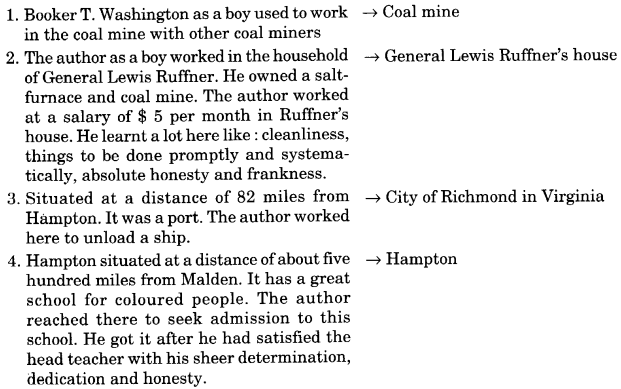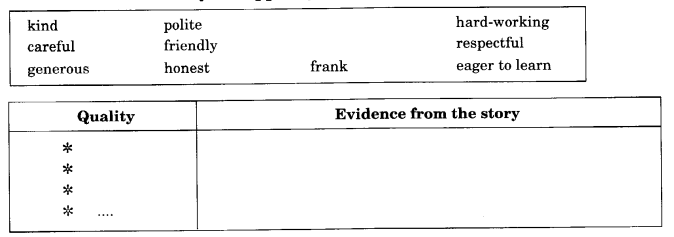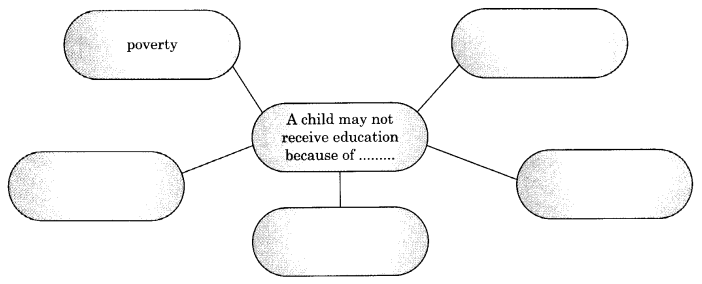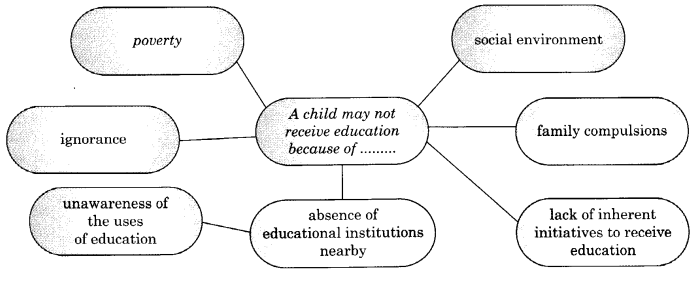NCERT Solutions for Class 10 English Main Course Book Unit 2 Chapter 4 Vocational Education are part of NCERT Solutions for Class 10 English. Here we have given NCERT Solutions for Class 10 English Main Course Book Unit 2 Chapter 4 Vocational Education.
| Board | CBSE |
| Textbook | NCERT |
| Class | Class 10 |
| Subject | English Main Course Book |
| Chapter | Unit 2 Chapter 4 |
| Chapter Name | Vocational Education |
| Category | NCERT Solutions |
CBSE Class 10 English Main Course Book Unit 2 Education Chapter 4 Vocational Education
TEXTUAL EXERCISES
Question 1.
This is Rohan. He is not interested in the usual set of professional courses like the ones mentioned above. Do you think he can try his hand at something else ? Work in pairs and try to find some courses that he may like from the word maze given below.
Answer:
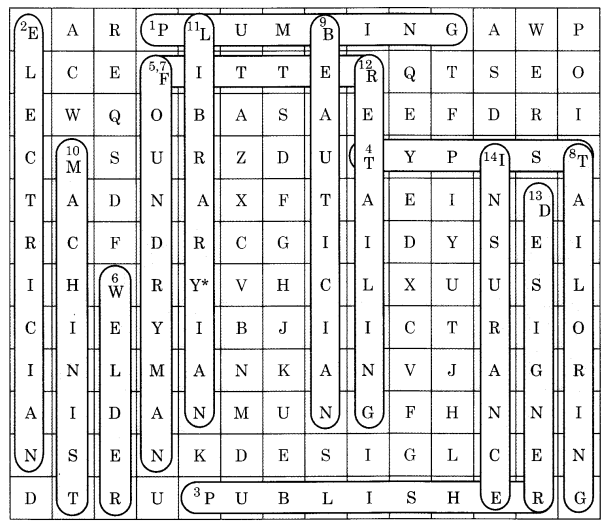
- Plumbing
- Electrician
- Publisher
- Typist
- Foundryman
- Welder
- Fitter
- Tailoring
- Beautician
- Machinist
- Librarian (Printing error in CBSE book)
- Retailing
- Designer
- insurance
Question 2.
Now that you have identified a few of the courses that Rohan can do, can you guess what would be their job profile and what category they can be placed under ? Given below is a table with jobs in column A and the job profile in column B (Jumbled up). Work in pairs to match the column A with column B and column C.
Answer:
| S.N. | Jobs A | Profile B | Category C |
| 1. | Fitter | A person who uses machine tools to make or modify parts, primarily metal parts | Technology |
| 2. | Machinist | A person who uses machine tools to make or modify parts | Technology |
| 3. | Foundry man | A person who works in a factory that produces metal castings. | Technology |
| 4. | Electrician | A tradesman specializing in electrical wiring of buildings, stationary machines and related equipment. | Technology |
| 5. | Welder | A person who joins two or more pieces of metal together | Technology |
| 6. | Typist | A person who types, esp for a living | Humanities |
| 7. | Retailer | A person who sells goods directly to the consumers | Commerce |
| 8. | Publisher | A person who is in the business of production and dissemination of literature or information | Commerce |
| 9. | Insurance Service Provider | A person who provides coverage for life and property | Commerce |
| 10. | Plumber | A tradeperson who specializes in installing and maintaining systems used for potable (drinking) water, sewage, and drainage. | Technology |
| 11. | Designer | A person who crafts clothes. furniture, crockery etc. | Humanities, Technology |
| 12. | Beautician | A person who is skilled in adornment of body | Home science, Humanities |
| 13. | Librarian | An information professional trained in the organization and management of information services or materials for those with information needs. | Humanities, Technology |
| 14. | Tailor | A person who makes, repairs or alters clothing professionally, especially suits and men’s clothing. | Home science, Commerce |
| 15. | Sheet metal worker | A person who manufactures various types of articles out of sheet metal | Technology |
| 16. | Sericulturist | A person who is in the business of rearing of silkworms for the production of raw silk | Agriculture |
| 17. | Horticulturist | The science of plant cultivation including the process of preparing soil for the planting of seeds, tubers, or cuttings. | Agriculture |
Question 3.
Vocational Education
Read the following article on vocational education.
Answer:
Students to read the text as desired on their own.
Question 4.
After reading the above passage, complete the notes given below :
VOCATIONAL EDUCATION
1.0 What is VE
1.1 Prepares ……………………………………….
1.2 Related to ……………………………………….
1.3 Generally at the ………………………………………. level.
1.4 Focus on ………………………………………. and ……………………………………….
2.0 Need of VE :
2.1 To sustain ……………………………………….
2.2 To provide ……………………………………….
2.3 Creates ………………………………………. by
2.4 Addresses ………………………………………. through
3.0 Concerns :
3.1 Low ……………………………………….
3.2 Rigid ……………………………………….
3.3 Obsolete ……………………………………….
3.4 Poor linkage ……………………………………….
4.0 Emerging Fields :
4.1 Globalization has resulted in ……………………………………….
4.2 New fields of employment :
- Hospitality
Answer:
1.0 → It is Vocational Education.
1.1 → learners for jobs
1.2 → manual or practical activities
1.3 → non-academic
1.4 → development of skills and practical work
2.1 → momentum of the economy
2.2 → skilled manpower
2.3 → more employment opportunities by equipping learners with entrepreneurial skills
2.4 → the changing face of technology through diversified courses.
3.1 → motivation among students to pursue vocational education
3.2 → mindset of parents
3.3 → many vocational courses being provided
3.4 → between institutions offering vocational courses and the private sector
4.1 → new sectors in both manufacturing and service industries
4.2 → …….
- Fashion technology
- Film and television
- Information technology
- Retail
- Healthcare
Question 5.
Based on the information provided in this section along with the input given below write an article on “The growing need for Vocational Education”! “Education Curriculum requires fresh perspective”.
Answer:
The Growing Need for Vocational Education / Education Curriculum Requires Fresh Perspective
It is a fact that there is a wide gap between the present education system and the needs of the sectors in the market. The present education system hardly meets the requirements of the employment sector.
Every year 6,50,000 Engineering graduates and approximately two million graduates pass out of colleges. But they need to be re-skilled to meet the requirements of the employing sector. The developed world requires knowledge workers and skilled professionals. Naturally this gap between what we produce and what we need affects the development of the country. There is pretty mismatch between the two—that is, between the skilled manpower required and skilled manpower available.
The reasons for this mismatch in the market are not difficult to trace. First of all, there is low motivation among students to pursue vocational education. Secondly, the mindset of the parents and educators is accepting vocational courses. Thirdly, many vocational courses have become obsolete. Fourth, there is lack of linkage between vocational course providing institutions and the employment sector.
This sort of gap between the skilled manpower required and skilled manpower available can be bridged. It is possible if more and more youth are motivated to join vocational courses and the mindset of the parents is changed. Secondly, the available facilities of vocational courses need to be updated as per the present day needs. Then there must be a linkage between vocational institutions and the private sector. On- campus interviews are a step in this direction but more is needed to be done.
Question 6.
Your school is planning to close down two vocational courses at + two level as the enrolment has not been very encouraging. However, the school has decided to hold a debate concerning this issue. The team that is able to convince the students will be the deciding factor for the courses.
Answer:
Holding of the debate at class level to be done as desired above. The debate (for and against) is given below :
Education should be Skill Based rather than Knowledge Based
(for the motion)
Worthy Chairperson, Secretary and dear students
Today I, Ajit, stand before you to speak for the motion on ‘Education should be skill based rather than knowledge based. You’ll agree with me that in today’s world skill based education is the need of the hour. We all need various services to get on well with life. If you come out of the classrooms of our educational institutions, you’ll realize that our studying conventional economics, history or other conventional courses are just meaningless. They don’t get us suitable jobs.
On the other hand, as a result of globalization, I personally feel, new sectors in both manufacturing and service industries have opened up. These are hospitality, fashion technology, film and television, information technology, retail, healthcare etc. Then if we look at other vocational courses we find a large number of service providing jobs. These, you’ll see, can make us employable.
The present day education is knowledge based. I am of the opinion that such a system of education is just not sufficient. Our country is developing. At this juncture, we need the services of plumbers, designers, welders, tailors, machinists, electricians, foundry men etc. Their jobs are technical. The vocational institutions have a major role in providing us such a manpower. I submit that you’ll see yourself that developed countries need these skilled personnel in a large number. These skills are the need of the hour. We don’t make welders, foundry men, technicians etc, in conventional knowledge based colleges and universities. So I am of the firm opinion that seeing the today world and its needs we need skill based education and not knowledge based one. I, therefore, support the motion.
Thank you very much.
Education should be Skill Based rather than Knowledge Based
(against the motion)
Worthy Chairperson, Secretary and dear students
Today, I Amit, stand before you to speak against the motion on ‘Education should be skill based rather than knowledge based’. I am of the opinion that we don’t need all the education to be skill based as is implied in the topic. Then we have a sufficient number of vocational institutions. These have been providing the necessary skill based education.
My knowledgeable friend has beautifully analysed and asserted that education should be skill based. You can yourself imagine what the future would be if we have skilled manpower without the personnel having knowledge based education. I submit that I personally feel that knowledge based education is a must for a developing country like ours. We need managers, bureaucrats, professionals of a high order who can plan and design things seeing the needs of the times. These professionals, I am of the opinion, can’t be from plumbers or technicians. They should be coming from colleges and universities and technical education institutions. These are IITs, IIMs etc, where knowledge based education is imparted.
I personally feel that the country’s progress today is more because of the personnel produced by these institutions rather than vocational institutions. I don’t deny the role and importance of this vocational personnel. But I am sorry to say that they are in a supplementary position to them. If there is a kind of linkage between the two, you will see that we needn’t be afraid of anything. Country’s all round progress shall stand fully ensured then. So I support the view that education should be knowledge based. I, therefore, oppose the motion.
Thank you very much.
Question 7.
Most children face dilemma while choosing the right stream at + two level. Most of them are unsure of what they want to do. The decision is taken based on popular choice, parents’ pressure or peer pressure.
Answer:
Meant for role-play at class level. How the role-play in groups of four is to proceed is given below :
Rashmi : With due respects to you all, I wish to place before you my deep desire of pursuing Photography/Choreography. I personally feel that I have a passion for them. I have no desire to study science and commerce. I love taking pictures of animals. My grandfather has gifted me with a camera. I think and am pretty sure that I shall realize my passion.
Father : Hearing what Rashmi has declared I feel a bit let down as I have had great hopes for her. I myself am an IITian, that is, an engineer and I want her to join IIT. Besides, Photography/Choreography may be good for hobbies, they are not at all good professions. Thirdly, I personally feel that these two professions are not at all meant for girls. So I wouldn’t like that Rashmi should go in for these disciplines.
Mother (Mrs. Saxena): Being a mother I feel a little apprehensive about Rashmi’s choice or passion. I think such a profession is not viable and moreso for women. I feel anxious whether Rashmi shall be able to survive in her profession of her choice as it is hardly meant for women. She, perhaps, may not get a job. Who knows what kind of a family she has had after her marriage ? I want to support her. But being a Hindu woman nurtured in Hindu culture ? I find it hard to agree to what Rashmi wants to choose. Rashmi’s father rightly says that such a profession is not meant for girls.
Ms Rita : Being a Counsellor I feel that Rashmi has been able to find out so early in life what she wants. I, therefore, support her. I would want mom and dad to let Rashmi do what she wants to do.
Father : Rita is right in her own perspective. But I find it hard to see Rashmi go in for these professions since these are men’s domain. I find it hard to see Rashmi in such a profession. I personally feel that it doesn’t have many job opportunities.
Mother : I am of the same opinion. I personally feel that this profession is not meant for women. Then there are little chances for jobs.
Ms Rita : I personally feel that Rashmi can excel in this profession since it is nearer to her heart, interests and gut feeling. She will devote to this profession with sincerity and devotion. This will pay the way for her on being on the top. When she touches the top, she would hardly need any job.
Rashmi : I have an intuitional feeling that if I am allowed to pursue this profession I will not need any job. Instead, I would need a few persons to do jobs for me. Secondly, no one knows what is in store in future for one. Precisely speaking, I want to be number 1 photographer or a choreographer in the world.
Father, mother, Ms Rita : In that case I think that we should bow down before Rashmi’s passion.
Rashmi : Thank you mom and daddy; thank you dear sister.
Question 8.
Your school has decided to introduce Mass Media Studies as a subject under the vocational stream. This is going to help students who want to pursue a career in films, its production and other attached fields. Write a notice for your school notice board informing all students who are studying in class X regarding the course.
Writing a notice.
Answer:
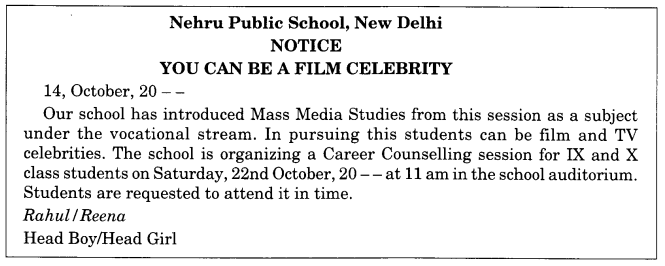
Question 9.
Rahul—in the picture is not only your co worker but also a good friend. When you see him working with so much diligence and dedication, you feel happy at having supported him when his father was against him learning to be a Machinist. Write a narrative piece on Rahul’s journey of self realization and success and how your support helped him achieve his ambition.
How I Helped Rahul
Answer:
I am really glad and contented to have supported Rahul in the profession of a Machinist when his father was against it. I am also a Machinist and feel completely contented to have chosen this profession. Rahul’s father wanted him to study Commerce and Accountancy. But I learnt from Rahul that he never liked this subject. He had a deep inclination, inherent liking and interest in the working of machines. So after we completed our + 2,1 decided to help Rahul to go in the profession of his liking.
It was a very hard time to convince Rahul’s father to let Rahul to be a Machinist. But when I myself chose it as a profession and gave Rahul’s father some convincing examples of a bright future he relented. At least I feel that if avocation and vocation are mixed together then work gets done nicely. Rahul’s dedication and devotion to his work and his curiosity to make something new shall enable him to be a force to reckon with. At last Rahul has realized that his potential lies in machines. I am sure that one day Rahul will be on top of the world in this profession. He shall be a pride for his parents and for me as well. It was I who mattered much in his being what he ever wanted to be. My good wishes to him on his bright future.
Question 10.
Read and ponder over the following story silently.
“Pelican Watching”—Donna Getzinger
SUMMARY
One day the narrator’s father took him fishing with him. Both he and his father sat in the boat and started up the motor. The narrator saw the birds flying. He asked his father about them. They were pelicans, came the reply.
The narrator’s father added that the little pelican was a baby and the big one her father. She was angry as she wanted to sit with her father on his post. But the narrator told that he won’t let the little one sit as he kept him pushing the baby pelican.
When papa pelican dived for a fish, the baby pelican caught the post. The narrator told his father that the baby pelican had caught the post. But the father told that it wouldn’t be for long. Meanwhile papa pelican came with a fish in his mouth, pushed off the baby pelican and swallowed the fish. The narrator told that it was not fair. Papa pelican should share his post and food with the baby pelican. But the narrator’s father replied that he didn’t know.
The narrator’s father asked him to go on. But the narrator told him to remain there a little longer. The next time papa pelican dived for fish. He came with the fish and put it on another post. He flew back to his own post and knocked the baby pelican off. Seeing it the narrator’s father said that the papa pelican wanted her to go to the other post. Baby pelican flew around. Due to the smell of the fish she landed on the other post and swallowed the food.
Papa pelican dove again and brought a fish. He didn’t give it to the baby pelican who squawked again and again. At this the narrator yelled to the baby pelican to get her own fish as she could get one.
The fourth time papa pelican dived . Baby pelican copied him and both came out with fish in their mouths. Both ate their food and papa pelican kissed the baby pelican. Obviously, he had taught her how to fish. The narrator’s father said seeing this that he had got hungry. They decided to catch some big fish.
The narrator’s father put bait on a hook and gave it to the narrator. But the narrator didn’t take it. He told his father that he just wanted to catch fish with his own pole. The father was glad and hugged him. The narrator learnt to put worms on the bait and both fished side- by-side. The narrator was cheered by his father each time he caught the fish.
This way the father taught his child through a practical.
Have a class discussion on the great lesson that human beings can learn from Papa Pelican.
Answer:
Students to read the text on their own as desired. A class discussion needs to be organised under the guidance of the teacher. Some more information is given below on the topic to help the students in this discussion :
The present story has two parallel sub stories—one of the father and the son – the other of pelicans as baby pelican and her father pelican. The father pelican is out to train the baby pelican in the field of life. He is and has to one day be harsh towards the baby pelican as it would help in teaching her the lessons of life. These shall enable one in how to survive with success. Father pelican doesn’t give her the fish he has caught because he wants the baby pelican to pick her own as she will have to one day when he won’t be there on the scene. It is a fact that one generation is born and the old one dies. In this cycle of life and death, one has to stand on his own one day to survive. One’s parents are never there for ever. Father pelican teaches this lesson to the baby pelican. This lesson thus teaches this hard truth of life that one must be on one’s own.
We hope the NCERT Solutions for Class 10 English Main Course Book Unit 2 Chapter 4 Vocational Education help you. If you have any query regarding NCERT Solutions for Class 10 English Main Course Book Unit 2 Chapter 4 Vocational Education, drop a comment below and we will get back to you at the earliest.
